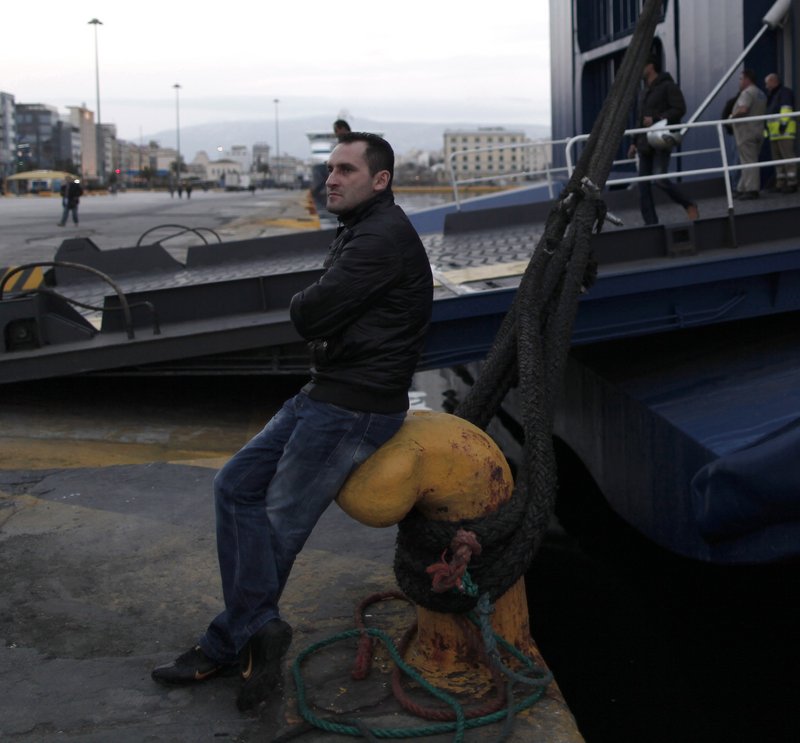ATHENS, Greece – Looking out across a room full of reporters gathered to welcome French President Francois Hollande on Tuesday, Greece’s President Karolos Papoulias gave a stark warning about the state of the country after three harsh years of government spending cuts, joblessness and tax hikes.
“We are faced with a societal explosion if any more pressure is put on society,” he said.
In spite of Greece receiving much-needed bailout loans, life seems to be getting worse for ordinary people.
Not only are Greece’s 1.35 million unemployed unable to make ends meet, but a growing number of those with jobs are struggling as more companies can no longer make regular salary payments.
As well as finding it harder to feed, heat and clothe themselves and their families, Greek workers also have to pay increasingly hefty taxes the government is relying on to turn the economy around.
Greece’s trade union organization, the GSEE, organized a general strike Wednesday to protest a new series of austerity measures. It warns that the labor force — which includes a large public sector — has been too badly weakened to help the battered country recover.
Union and independent analysts are worried Greece will face further years of economic struggle and protest as too many demands are placed on a shrinking work force.
Since it was priced out of the international debt markets in 2010, Greece has relied on emergency loans from other eurozone countries and the International Monetary Fund. To continue receiving these loans, the Greek coalition government has had to agree to harsh spending cuts and tax hikes to try to lower public debt.
These measures, however, have also put the brakes on Greece’s economy and hit ordinary Greeks hard.
“The government is thus caught between a rock and a hard place, trying to balance the demands of its domestic and foreign audiences,” said Martin Koehring, Greece analyst at The Economist Intelligence Unit. “We expect political risk — social unrest and the instability of the fragile three-party government coalition — to remain a major focal point in Greece this year.”
The country of nearly 11 million people is stuck in a five-year recession. Greece now has the highest unemployment rate in the 17 European Union countries that use the euro, with 27 percent out of work — 60 percent of those aged under 24. The government-funded research institute KEPE has forecast that unemployment will hit 30 percent this year.
The crisis has left 450,000 households with no one working, while a one-year limit on unemployment benefits — and strict rules to qualify for them — mean just 225,000 jobless Greeks are currently receiving monthly state assistance.
Maria Kanga, an unemployed mother of two, is worried about what she’ll do when her assistance runs out this summer. She was fired from a chain of record stores that went out of business last year. Along with more than 150 other employees, she was left unpaid for five months and received no severance money.
Protesting outside a Eurovision Song Contest event hosted by a company co-owned by her former employer, Kanga summed up her situation: “We’ve cut back on everything. My daughter is 12 years old. She has one pair of shoes. If they get wet, there are no spares.”
“Greece is not a country of bright lights and flashy events. It’s a country with people committing suicide, of those unable to feed their kids properly, or who steal from the supermarket. It’s happening to everybody. We are these people.”
Normally, those left in employment would be able to help support a government and the economy by spending and paying their taxes. But in Greece, as jobs continue to vanish at an alarming rate, hundreds of thousands of workers are no longer paid regularly, with struggling businesses unable — or sometimes unwilling — to meet their payrolls.
According to GSEE researchers, two-thirds of private sector employees no longer get regular pay. Adding to these problems are large tax increases.
Struggling to pay down debts, The government’s latest austerity measures include an overhaul of tax rules, axing deductions used by most families — for having children, mortgages on first homes, life insurance and some education expenses.
Most people earning up to 25,000 euros ($33,425) a year will see a small decrease in their income tax bill, but everyone above that level will see an increase.
Someone earning 35,000 euros, for example, previously paid 7,070 euros in taxes per year but will now pay 8,050.
The pressure is pushing Greece toward a tipping point at which too many demands are placed on a shrinking tax base, argues Savas Robolis, a professor of economics and public policy at Panteion University in Athens.
Early signs from 2013 suggest high taxes may be backfiring: January revenues sank 572 million euros ($765 million) from last year’s figure to 4.42 billion euros ($5.91 billion).
Send questions/comments to the editors.



Success. Please wait for the page to reload. If the page does not reload within 5 seconds, please refresh the page.
Enter your email and password to access comments.
Hi, to comment on stories you must . This profile is in addition to your subscription and website login.
Already have a commenting profile? .
Invalid username/password.
Please check your email to confirm and complete your registration.
Only subscribers are eligible to post comments. Please subscribe or login first for digital access. Here’s why.
Use the form below to reset your password. When you've submitted your account email, we will send an email with a reset code.